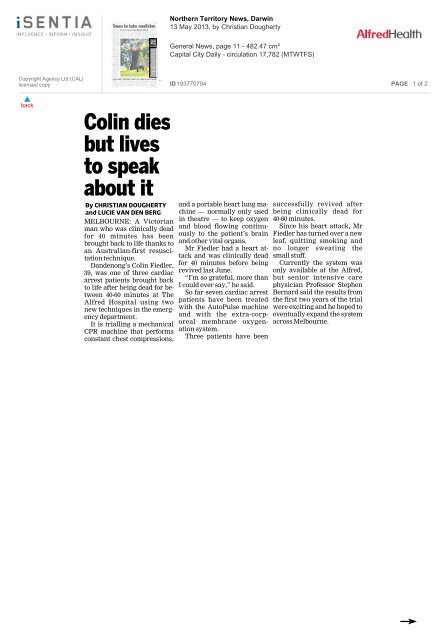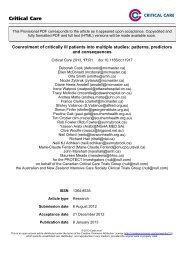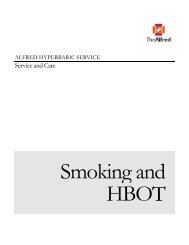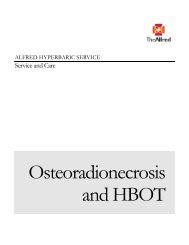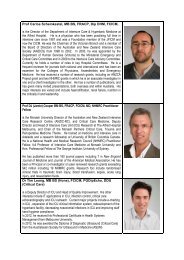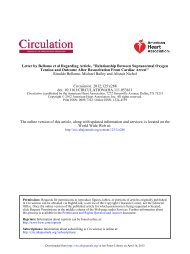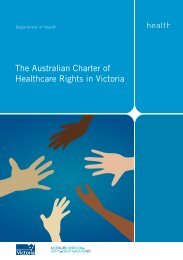Media Report
Media Portal Report - Alfred Intensive Care Unit
Media Portal Report - Alfred Intensive Care Unit
- No tags were found...
You also want an ePaper? Increase the reach of your titles
YUMPU automatically turns print PDFs into web optimized ePapers that Google loves.
By CHRISTIANDOUGHERTY<br />
MELBOURNE: A Victorian<br />
and LUCIEVAN DENBERG<br />
man who was clinically dead<br />
for 40 minutes has been<br />
brought back to life thanks to<br />
an Australian-first resuscitation<br />
technique.<br />
Dandenong’s Colin Fiedler,<br />
39, was one of three cardiac<br />
arrest patients brought back<br />
to life after being dead for between<br />
40-60 minutes at The<br />
Alfred Hospital using two<br />
new techniques in the emergency<br />
department.<br />
It is trialling a mechanical<br />
CPR machine that performs<br />
constant chest compressions,<br />
and a portable heart lung machine<br />
— normally only used<br />
in theatre — to keep oxygen<br />
and blood flowing continuously<br />
to the patient’s brain<br />
and other vital organs.<br />
Mr Fiedler had a heart attack<br />
and was clinically dead<br />
for 40 minutes before being<br />
revived last June.<br />
‘‘I’m so grateful, more than<br />
I could ever say,’’ he said.<br />
So far seven cardiac arrest<br />
patients have been treated<br />
with the AutoPulse machine<br />
and with the extra-corporeal<br />
membrane oxygenation<br />
system.<br />
Three patients have been<br />
successfully revived after<br />
being clinically dead for<br />
40-60 minutes.<br />
Since his heart attack, Mr<br />
Fiedler has turned over a new<br />
leaf, quitting smoking and<br />
no longer sweating the<br />
small stuff.<br />
Currently the system was<br />
only available at the Alfred,<br />
but senior intensive care<br />
physician Professor Stephen<br />
Bernard said the results from<br />
the first two years of the trial<br />
were exciting and he hoped to<br />
eventually expand the system<br />
across Melbourne.<br />
Northern Territory News, Darwin<br />
13 May 2013, by Christian Dougherty<br />
Colindies<br />
butlives<br />
tospeak<br />
aboutit<br />
General News, page 11 - 482.47 cm²<br />
Capital City Daily - circulation 17,782 (MTWTFS)<br />
Copyright Agency Ltd (CAL)<br />
licensed copy<br />
ID 193770794 PAGE 1 of 2<br />
back<br />
Colindies<br />
butlives<br />
tospeak<br />
aboutit<br />
By CHRISTIANDOUGHERTY<br />
and LUCIEVAN DENBERG<br />
MELBOURNE: A Victorian<br />
man who was clinically dead<br />
for 40 minutes has been<br />
brought back to life thanks to<br />
an Australian-first resuscitation<br />
technique.<br />
Dandenong’s Colin Fiedler,<br />
39, was one of three cardiac<br />
arrest patients brought back<br />
to life after being dead for between<br />
40-60 minutes at The<br />
Alfred Hospital using two<br />
new techniques in the emergency<br />
department.<br />
It is trialling a mechanical<br />
CPR machine that performs<br />
constant chest compressions,<br />
and a portable heart lung machine<br />
— normally only used<br />
in theatre — to keep oxygen<br />
and blood flowing continuously<br />
to the patient’s brain<br />
and other vital organs.<br />
Mr Fiedler had a heart attack<br />
and was clinically dead<br />
for 40 minutes before being<br />
revived last June.<br />
‘‘I’m so grateful, more than<br />
I could ever say,’’ he said.<br />
So far seven cardiac arrest<br />
patients have been treated<br />
with the AutoPulse machine<br />
and with the extra-corporeal<br />
membrane oxygenation<br />
system.<br />
Three patients have been<br />
successfully revived after<br />
being clinically dead for<br />
40-60 minutes.<br />
Since his heart attack, Mr<br />
Fiedler has turned over a new<br />
leaf, quitting smoking and<br />
no longer sweating the<br />
small stuff.<br />
Currently the system was<br />
only available at the Alfred,<br />
but senior intensive care<br />
physician Professor Stephen<br />
Bernard said the results from<br />
the first two years of the trial<br />
were exciting and he hoped to<br />
eventually expand the system<br />
across Melbourne.


